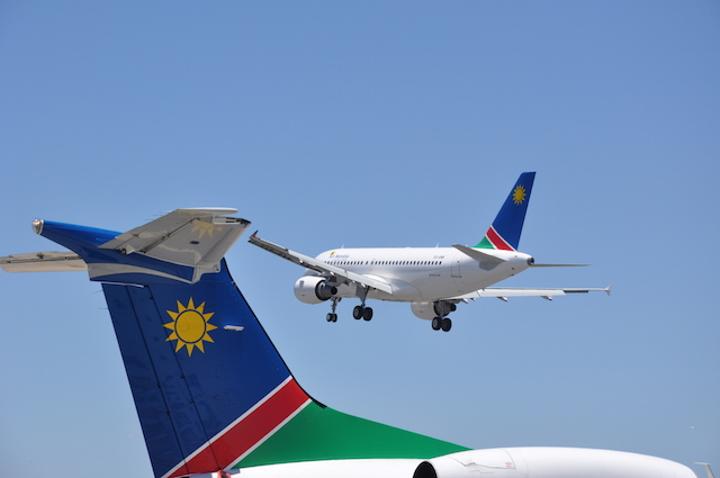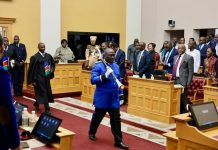Africa-Press – Namibia. BEFORE we delve into a review of 2021’s economics, let’s have a moment of silence for Air Namibia, as we welcome Fly Namibia.
This is a year that could return if we don’t stop making the same mistakes over and over again, expecting different or better results. Like reappointing the same people with the same mindsets to lead key institutions. But even then, we have made up our minds that to 2022, we would, God-willing, be there.
2021 was the second year the world wrestled with Covid-19. What the virus did to our economy is still being felt in every corner of the country.
It has left many with the deep scars of unemployment, low productivity, and an awkward way of greeting each other. At least 12 000 people have lost their jobs during the pandemic – excluding the informal sector.
The year started off with the Canadian-listed oil exploration company Reconnaissance Energy Africa announcing that it had commenced with the drilling of the first of three wells in the north-east of Namibia.
This drilling would later be a problem as many took to the streets to protest against it. Hollywood actors and even former minister of industrialisation and trade Tjekero Tweya also spoke out loudly against the alleged injustice of the deal.
The company, however, still continues to operate. In office for about a year, minister of finance Iipumbu Shiimi delivered serious blows to former Air Namibia employees.
He was wearing a navy blue suit when he and minister Leon Jooste announced that the loss-making Air Namibia had been placed under voluntary liquidation.
The company told 636 employees to go home, and they would be paid one year’s salary. Air Namibia was a mess though. Its liabilities were close to N$5,4 billion, including N$800m owed in taxes to the government, and N$708 million to the Namibia Airports Company.
Politicians and senior government officials must just know they failed Air Namibia, and equally so its board of directors. March was better, and the month ended with the state handing over the oil storage facility to the National Petroleum Corporation of Namibia (Namcor).
The first shipment of commissioning had already been received at the end of 2020. Namcor has rolled the ball. It aims to have 33 operating fuel stations around the country, which some say is not a sustainable idea.
Shiimi also tabled his 2021/22 national budget in March, giving millions to the establishment and running of the Namibia Investment Promotion and Development Board, an institution now flooded with former colleagues from PwC Namibia.
Someone told me this year that chartered accountants make bad deal makers, but let’s wait and see what Nangula Uaandja and her team deliver after a year in operation.
I am talking of actual deals, not conferences. But as a country we got money this year – a few billion from the African Development Bank (AfDB) and the International Monetary Fund (IMF).
The IMF gave the country N$3,9 billion with an interest rate of 1% – a serious bargain. This easy money is something the president’s economic adviser, James Mnyupe, is after. He will later during the year sell a sustainability bond issuance ticket.
It did not take long after the money was received before then minister of defence and veterans affairs Peter Vilho resigned over allegations of taking kickbacks linked to a N$1,8 billion arms tender 13 years ago.
Few know where he is now or what he is doing. A video of him dancing the kizomba surfaced earlier this year. But seriously, who tells auditors not to check their books? Especially after being allocated billions in taxpayers’ money every year.
In April, the president launched the Namibia Revenue Agency (Namra). Sem Shivute is its first commissioner, who is certainly limited by what he has to work with.
A lighter note, Namibia exported charcoal to the United States (US) this year, which could perhaps be used to roast turkey. The value of the shipment was around N$2 million.
After Vilho’s resignation, the president appointed Frans Kapofi to replace him. Then he removed Albert Kawana from fisheries and replaced him with Derek Klazen. Everybody is Klazen’s brother, and fishing quotas are somewhat in reasonable hands, some have said. Others, not so much.
This year, Ruth Herunga served as Fishcor’s interim chief executive officer (CEO), straight from the board of directors, and later went on to want to become the prosecutor general. That was going to be an interesting switch on the Fishrot case had she succeeded.
By the end of May, Germany was full of shame, and they agreed to apologise for the genocide perpetrated against the Herero and Nama people, and pay Namibia €1,1 billion over 30 years as a gesture of reconciliation, but will not use the term ‘reparations’.
This deal had the former Standard Bank Namibia chief executive Vetumbuavi ‘Vetu’ Mungunda shining his mathematical skills – to him, a trillion dollars make more sense.
Vetu is a learned guy who founded Ombu Capital this year and is responsible for the N$5,5 billion deal Namibia Breweries’ shareholders will pocket soon – him and Afra Schimming-Chase.
Watch those two. In June, Namibia learned well as the second auction of 15 948 tonnes of hake raised N$189,9 million. Mid-June, the US announced it would ban corruption-accused Bernhard Esau and Sacky Shanghala from entering the country.
The ban would also cover their immediate families. Isabel dos Santos also recently joined this list of banned elites. Winter was really bad, with Covid-19 doing much damage. The country lost wonderful hardworking men and women.
A moment of silence. The year also saw Ericah Shafuda leaving the Ministry of Finance for greener pastures. By July, the Affirmative Repositioning boys, girls, men and women raised steam. They wanted the removal of the so-called colonial redline or veterinary cordon fence. They demanded it should be declared “unconstitutional”.
Green hydrogen became topical in early August. It has been a frenzy since and James Mnyupe is having sleepless nights, but so is Tate Michael, who has come out strongly saying the presidency stole his idea – a conversation for another day.
On 5 August, The Namibian received a licence to operate a radio station, called Desert Radio. Jossy Joss is the lead guy. His talent remains unmatched, and the team he has put together is a formidable force with their daily ‘Breakfast in the Desert’ show.
Late in August, the Namibian Investment Promotion and Development Board announced its intention to create its own branded physical and online retail store by the end of this year to stock exclusively Namibian goods produced by small and medium enterprises.
Fast forward to September, MTC’s prospectus was out, shares were undersubscribed, but the company was listed. N$2,4 billion into minister Shiimi’s treasury box is a lot of money.
Mid-September, the good news came that Namibia would soon have its own barcode, which was granted by the Global GS1 Office based in Geneva. The three months of the year were crazy, exciting, and sad at the same time. It is a concoction of what young people now started calling ‘leeu’.
Yeah, neh. In October, we identified the late Aaron Mushimba in the Pandora Papers. Looks like he had ties with serious bankers in Amsterdam. By the way, who is Johan Panderis?
Then came Namdia, drooling over 50% of De Beers’ production, and apparently it would be good for Namibia. Namibia’s ambassador to Belgium, Amb Mekondjo Kaapanda-Girnus, is serving them well though – check her Twitter account.
Namdia is looking for a new chief executive officer (CEO), by the way, and they have written off their investment in the Okahandja-based Namgem factory, which they bought from diamond magnate Maurice Templesman.
The current CEO of Namdia is Kennedy Hamutenya. Why do they want a new CEO? Then came November: MTC listed, and the O&L group decided to redeem itself from selling alcohol by selling the 51,1% stake it has in Namibia Breweries Limited to Heineken NV.
Sven Thieme said he was pained by the decision. But he did not cry. Also just in case you have family and friends who live in WIndhoek and rent, take note that almost 40% of their earnings goes to rent – so there will be no money for gifts this year.
Just 19 days ago, the Presidency announced that Johannes !Gawaxab should stick around the Bank of Namibia until he is 70. Alongside his reappointment is that of Leonie Dunn as the second deputy governor of the bank. Our good friend and current deputy governor Ebson Uanguta will chill in that spot for another five years, starting 2022.
The repo rate was flat all throughout the year at 3,75%. Inflation is still edging up. Fuel prices are skyrocketing, and the taxi fare is now N$13,00.
Namibia was also recognised as being the country with the best roads in Africa, an award my younger brother did not agree to. “Namibian weather allows for the country to have better roads,” he said, while shaking his head.
It was a rough year, but we thank those who helped steer the business ship in the right direction. The restructuring of many companies were painful, but necessary.
Also, a small shout-out to Michael Humavindu at the Ministry of Industrialisation and Trade, and Jona Musheko at the Ministry of Agriculture, Water and Land Reform. Continue serving well. That was the year. Let us rest, and come back to 2022 stronger. If we don’t, we would still be stuck in 2021.
For More News And Analysis About Namibia Follow Africa-Press






